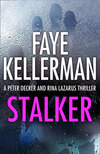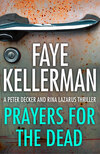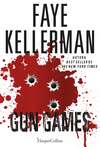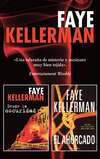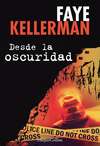Kitabı oku: «Jupiter’s Bones», sayfa 4
 6
6
The thermos of coffee had run dry. Reluctantly, Decker traded the one vice for another. Reaching in the glove compartment of his unmarked, he pulled out a loose cigarette. This one happened to be a Marlboro, but it really didn’t matter. It had nicotine; it would do. He cranked the windows down, sat back in the driver’s seat and lit up, staring out the windshield as smoke exited from his nose and mouth. Chiding himself for the weakness although not too harshly.
He had quit the noxious habit for almost six years. But then came a bloodbath, and the horrific images just wouldn’t quit. The dreaded flashbacks—over a year old—popped up at inconvenient times. It was at those moments when Decker went for the rush. He didn’t fully understand why he’d been thinking about that grisly scene at Estelle’s restaurant. If he had to rationalize it, he’d most likely chalk it up to a hinky feeling about the safety of the children still residing within the compounds of the Order of the Rings of God.
He smoked slowly … leisurely, washing his nerves with a chemical calm. Since becoming a detective lieutenant, he rarely visited crime scenes—only in the extraordinary cases. Like Estelle’s … like this one. The death of famous people always made news, although Ganz hadn’t been an important figure in science for a long time.
The meat wagon had left ten minutes ago, Ganz’s body safely aboard and heading for the morgue. Decker’s job was basically over. Now it was up to the pathologist. If all went well, he’d close shop here within fifteen minutes. He was hungry—it was past two in the afternoon—but wolfing down a sandwich in the car was bound to create a storm of stomach acid. Better to wait and grab a late lunch at home if possible. If not, even his desk was a better place to dine than behind the wheel of a car. He had just finished his smoke when Marge and Scott Oliver came through the gate of the compound. He got out of the car and waved them over.
“What did you learn from Venus?” he asked Marge.
She took out her notes. “The story goes like this. She went into Jupiter’s room around five in the morning. He had been sitting semiupright in his bed and appeared to have been sleeping.”
“Eyes closed?”
“Yes, eyes closed. At least that’s what she said. Venus called out to him. When he didn’t answer, she tried to shake him awake. At that point, he fell over lifeless, and she screamed. Her yells brought Pluto to the room. Immediately, she was ushered out, and taken back to her room. Half hour later, Pluto came to her and told her that Jupiter was dead.”
Oliver said, “So she was in her room for a half hour, just waiting to hear something?”
“Yep.”
“Alone?” Decker asked.
“With one of her attendants.” Marge hesitated. “Alpha-two.”
“That’s the name?”
“Apparently.”
Oliver said, “So what was happening with Jupiter between the time she discovered his supposedly dead body and the time Pluto brought her the news?”
“I don’t know. We should speak to Pluto—”
“Wait, wait, wait,” Decker interrupted. “Scott, why did you say his ‘supposedly dead body’? Any reason to think that Jupiter wasn’t dead at that point?”
“Loo, if someone would have done the normal thing—call in the paramedics or 911 as soon as the body was discovered—I would feel a lot better about this being a suicide. The way it stands now, with no official around to verify Ganz’s death until we arrived, which was around … what, Margie? Around seven?”
“Closer to seven-fifteen.”
“When’d you get here?” Oliver asked Decker.
“Quarter to eight.”
“So between the time that Venus went into Jupiter’s room and someone from the outside actually saw the body—that’s two hours. What do we think happened during that time? We’ve assumed that someone moved the body from the crime scene to the temple. Because we were told that Jupiter died in his bed. But we’re not even sure if that’s true. We also know that some dude named Nova signed a death certificate.”
“Anyone talk to him?” Decker asked.
Oliver said, “They couldn’t seem to locate him—which also makes me suspicious. Pluto said I could come back after dinner—around six. Being as it’s after two, I figured why push it for four hours. Now I know they’re going to prep Nova—tell him what to say and what not to say. But if he’s not a pathological liar, I’ll be able to see through that crap.”
Decker agreed. Oliver turned to Marge. “You want to come back with me?”
“Yeah, I’ll come back with you.”
“So what are you doing for dinner? Want to do Chinese?”
“I’ll do Chinese.”
Oliver turned to Decker, “I don’t suppose you’ll be joining us.”
“Thanks anyway, but I’d like to see my wife.”
Oliver said, “I used to have one of those.”
Decker smiled. “Yeah, well … tell you what. You two come over to the house after Nova’s interview.”
Marge chuckled. “Rina would love that.”
“She won’t be thrilled, but besides being a good sport, she genuinely likes you two.”
“Aw shucks, I’m a-blushin’.” Oliver grinned. “Exactly how much does she like me?”
Decker wagged his finger, then turned serious. “So you think something nasty went down, Scott?”
“Yep. Moving the body is a cardinal sin, and they should have known better.”
Decker organized his thoughts. “Let’s back it up … to your statement about the body being supposedly dead. For the moment, let’s assume that Venus was telling the truth: that she found Jupiter either dead or near death. If Jupiter was near death instead of actually dead, are you saying that someone, during those unaccounted for hours, knocked him off?”
“Why not? It’s possible.”
“But why would someone bother to commit murder if Ganz was already dying?”
“Because maybe Jupiter had a chance of surviving if someone called the paramedics. Could be that Venus was about to call 911, and Pluto stopped her. He sent her back to her room, so he could do dirty work.”
“Why would Pluto have wanted Jupiter dead?” Decker asked.
“Because Pluto wanted control of the Order.”
Marge said, “Venus claims the Order is now under her control.”
“There you go,” Oliver said. “Jupiter isn’t even dead for twenty-four hours and already they’re at each other’s throats. Who knows? Maybe they’re in it together.”
“Who? Venus and Pluto?” Marge shook her head. “I don’t think so.” She flipped through her scribblings. “Point of fact. Venus claims not to have noticed any medication on Jupiter’s nightstand. She said she was taken away and didn’t have time to absorb her surroundings …”
“And that would jibe perfectly with my theory,” Oliver said. “Pluto pushes her away before she can call the paramedics. Then he places the empty Valium vial in the room to make it look like a suicide.”
Decker said, “If someone wanted to fake a suicide, don’t you think the vial would have been placed in the room before Venus arrived?”
“Maybe Pluto was about to do it, but was interrupted by Venus’s sudden appearance.” Oliver rocked on his feet. “Loo, what makes the whole thing suspicious is that the body was fresh. Coronor places the time of death within two hours of the discovery. Rigor mortis hadn’t set in.”
“Most common time of death is in the early morning,” Marge said.
“But we’re not thinking death by natural cause, Margie.”
Decker said, “Maybe it took Jupiter all night to summon up the nerve to do himself in. First, he drank the vodka to lower his inhibitions. Next he finished himself off with the pills.” He ran his hand through thick tufts of hair. “Or maybe Jupiter was a lush and a pill popper, and this was a simple accidental overdose.”
Oliver looked dubious. “He downed a fifth of vodka.”
“We’ve all known alkies who drink that much for breakfast.”
“Venus said he didn’t drink or take pills,” Marge stated.
“According to her.” Decker stuffed his hands in his pocket. “We’ve got a suspicious death—three options. Accidental OD, suicide or homicide. We may never be able to distinguish between accidental OD or a suicide. But that’s not that important for us. The only thing that gets us involved is a homicide. So the question is this: Can you force someone to chugalug a fifth of vodka and/or down a bottle’s worth of Valium?”
Oliver said, “If the guy was a secret drinker, someone could have dissolved the pills in the booze.”
“Valium’s insoluble in water,” Decker said.
“Then maybe someone ground the pills up in his food.”
“Valium has a bitter taste—”
“So Pluto injected it into Ganz’s veins,” Oliver tried again. “In case you’ve forgotten, the body had fresh needle marks.”
“Venus said Jupiter often injected himself with vitamins,” Marge commented.
“Injected himself?” Decker asked. “He had IM needle marks on his butt.”
“Sometimes she’d do it,” Marge said.
“How convenient,” Oliver mocked. “The logical assumption is that someone stabbed him with an IV needle, telling Jupiter that it was his vitamins. Meanwhile guy’s being shot up with a lethal dose of Valium.”
“The drug burns like hell when you inject it,” Decker said. “Jupiter was a scientist. He would have known immediately that he wasn’t being shot up with vitamins.”
“But by that time, it would have been too late—”
Decker said, “I don’t like it. Too many ‘ifs.’”
“So maybe Jupiter was dead drunk when he was dosed up with Valium,” Oliver retorted. “Maybe he had already been knocked out with the vodka.”
“You’re saying Ganz drank himself comatose, then someone finished him off with the Valium?”
“Why not?” Oliver asked.
“For one thing, it’s messy.” Decker paused. “You’re saying that someone went to all this trouble just to take over as leader of the Order.”
“Loo, you met that twerp, Pluto. He lusts for control.”
Decker said, “So you not only have a theory, you have a prime suspect.”
“Pluto had the means, the motive and the opportunity. He was Jupiter’s privileged attendant.”
“He was one of four privileged attendants,” Decker said.
“But the first one on the scene after Venus, and he’s the only one who’s come forward as the leader. He needs to dominate. I’m telling you, there’s something off with that guy.”
“Scott, Pluto has been with Jupiter for years. Why now?”
“Because Jupiter was out cold from the vodka. The perfect opportunity presented itself.”
Decker conceded Oliver some points. He said, “Even if the path report comes back with drugs and booze in Jupiter’s system, we’ll still have no way of knowing if Jupiter’s death was suicide or homicide. Not without other overriding evidence. If you have something up your sleeve, Scott, I’m all ears.”
“No direct evidence,” Oliver answered. “Just twenty years experience.”
“I don’t discount that,” Decker said. “But we can’t open a murder case based on your experience.”
“Can I put in my two cents for suicide?” Marge asked.
Decker said, “Let’s hear it.”
“Venus said that Jupiter hadn’t been himself lately. That he hadn’t been exactly ill, but … how’d she phrase it?” Marge consulted her notes. “He hadn’t been his usual spirited self. He’d been drained of his energy, he held his head a lot … like he had headaches. But when she asked him about it, he assured her that this was all part of the process.”
“What process?” Decker asked.
Marge let out a small chuckle. “Well, here goes nothing.” As Marge recounted the leader’s supernatural ideas, they sounded even stranger than the first time she had heard them.
“So he was receiving radiation from all these parallel universes.” Oliver gave her a sneering smile. “Well, why didn’t you just say so. That explains everything.”
“I’m not giving credence to her hypotheses, Scott. I’m just saying maybe he was ill with something serious and he decided to mask it in quasi-scientific theory.”
“Why would he do that?” Oliver asked.
“So as not to upset his followers,” Marge said. “Maybe he decided to go out with dignity rather than suffer an agonizing death.”
“What makes you think he was suffering from a physical illness?” Decker asked. “To me, it sounds more like psychosis … voices telling you to do strange things.”
“Or like a drunk after imbibing a fifth of vodka,” Oliver put in. “I’ve heard those kinds of voices before. They sound a lot like my buddies egging me on.”
“I’m serious,” Decker said.
“So am I,” Oliver retorted. “If Ganz drank a lot, I’ll bet he heard voices.”
Marge said, “To hear Venus describe Jupiter … he sounded like a man with something on his mind.” She tapped her foot. “There’s more to Jupiter’s illness than what Venus told me. I feel it in my gut.”
“I’m sure you’re right,” Decker said. “But I can’t base a case for suicide on your gut feelings any more than I can base a homicide on Oliver’s experience.”
“So what do you suggest?” Oliver asked. “We keep poking around until we find something that throws us to one side or the other?”
“Exactly. And you can start with Nova. Find out what on earth possessed him to sign a death certificate. Even if he is a doctor and it’s not strictly illegal, it’s a gross irregularity.” Decker looked up at the sky. “Let’s keep the files on the Jupiter/Ganz case open for a while, if for no other reason than to look after the Order’s kids. I don’t want this death paving the way for another Heaven’s Gate or Jonestown.”
“Absolutely,” Marge said. “With Jupiter gone, who knows what they’re thinking.”
Decker said, “Meanwhile, there are loose ends that we can clear up, the first being who told Ganz’s daughter about her father’s death. When I asked Pluto about it, he claimed he didn’t know. Seemed pissed about the leak, grumbling something about the chain of command being broken. The guy does walk around like he has a ramrod up his ass.”
“You don’t like him either,” Oliver said.
“I don’t like lots of people,” Decker said. “But not all of them are criminals.” A pause. “Just a high percentage.”
Marge smiled. “Venus doesn’t know who called Europa either,” she said. “She claims that Europa hadn’t seen her father in over fifteen years.” She turned to Decker. “Weren’t you planning on interviewing her?”
“Planning to do it sooner or later.” Decker looked at his sack lunch, sitting on the passenger’s seat of his unmarked. Guess he was going to eat in the car after all.
 7
7
Over the phone there were no signs of tears, no long sighs, nor any mawkish sentiment. Europa was polite but all business. Of course for her, the loss of her father happened years ago, so Decker supposed her grief had happened then. She was still in her office when Decker had called, and would be there for at least another hour. She told him to come down although she wasn’t sure why he wanted to talk to her.
“Just a few questions,” Decker said. “Tie up a couple of things.”
“For a few questions, a telephone is very expedient,” Europa answered.
“I’m a face-to-face kinda guy,” Decker answered. “I hope you don’t mind. It shouldn’t take too long.”
“Well, I’m an e-mail-to-e-mail kinda gal. But I suppose it wouldn’t hurt me to make human contact. Sure, come down.”
Decker got into his unmarked, apologized to God for not ritually washing his hands, then bit into his turkey sandwich. The fresh meat was thinly sliced with lots of mayo and Dijon mustard, just the way he liked it. No, the food wasn’t the problem. It was the lack of company. He picked up the cell phone and dialed home.
Rina answered after three rings. “Something tells me you’re not on your way here.”
“How’d you know?”
“You’re talking with your mouth full. You’re also on the cellular. Which means you’re probably driving. Driving and eating mean you’re in the field working.”
“You should be in my profession.”
“You’re not only driving and eating at the same time, you’re also talking. If a cop sees you, he’s going to pull you over.”
“I’ll fix the ticket. I know people.”
“It’s not the citation I worry about. Just be careful, Peter. Traffic is getting worse and worse each year.”
“That’s true. Is the baby home yet?” The baby being five years old. “Or is today her long day?”
“Today is her long day at school.”
“So we could have had some real time together?”
“Yes.”
“Ouch!”
“Your choice. What are you working on?”
“The Ganz thing.”
“The news is saying it was a suicide.”
“Maybe.”
Rina said, “Maybe as in probably a suicide? Or maybe as in maybe yes but maybe no?”
“Maybe as in I have to investigate every angle before I close up the file.”
“And the department requires a second-grade lieutenant to do the investigation?”
“Ganz was once a famous man.”
“I see. Am I wrong or do I smell politics?”
“What can I say? Strapp said he’d have someone cover for me in the division. When he says that, it means the guy is on the hot seat. Man, you make a mean turkey sandwich!”
“Thanks. You’re my best customer.”
Decker placed the borrowed videotape in the glove compartment of his car. “I’ve got a tape for us to watch when we get home.”
“What kind of tape?”
“Don’t know.”
“Sounds exciting,” Rina said. “Should I breathe hard?”
“Don’t bother. It’s probably more spiritual than physical.”
“Now I’m curious.”
“Good, it’ll keep you up in case I’m home late.”
“Before I forget, Cindy called.”
Decker’s heart took off. “What happened?”
“Nothing,” Rina said. “She’s taking four-day, twelve-hour shifts, that’s all.”
“But she’s okay?”
“Great! Never sounded happier.”
Thrilling, Decker thought.
“She wants to go with you to the range,” Rina said. “Call her when you get a free moment.”
Shooting forty-fives and Berettas at the head and chest regions of paper felons—a real father/daughter bonding experience. Decker said, “I’ll call her tonight. Maybe we can go next week if it’s okay with you.”
“It’s fine with me.” She hesitated. “And if you go to a public range, maybe you can take Sammy?”
Decker was taken aback. “Why in the world would I do that?”
“Because Sammy has made up his mind where he wants to study in Israel next year. He wants to go to a yeshiva in Alon Shvut—Gush Etzion. It’s behind the green line and—”
“Hold on! What do you mean behind the green line?”
“It’s in the territories, so they do Shmerah there—guard duty. It wouldn’t hurt him to have a jump-start on how to handle a weapon—”
“What?!” Decker suddenly realized he’d missed his turn-off. He also realized his heart was still hammering inside his chest. He pulled onto the shoulder of the freeway, and killed the engine. “Hold on a friggin’ minute! When was this decided?”
“He was going to say something to you this morning but you rushed off—”
“Excuse me, I was called off!” He was shouting, but he didn’t care. “Rina, how could you agree without at least talking it over with me! How could you agree to it period! You’re his mother, for goodness sakes! Don’t you care about his safety?”
“Peter, I used to live in Gush—”
“And cavemen used to grunt instead of talk.” He took a deep breath, resisting the urge to reach for a cigarette. “Allowing Sammy to go to Israel was a big concession for me. I love that boy!”
“So do I—”
“I’ll be damned if I’m going to put him in danger! Going anywhere within the disputed territories is out of the question! End of discussion.”
The line went dead for a moment.
Decker said, “Are you still there?”
“Yes, I’m still here.”
“Rina, I’m expecting a united front on this one!”
“Peter, as his mother, I agree with you one hundred percent. Except we’re not just two parents, we’re three. He told me that if Gush was good enough for his father, then it’s good enough for him. Now what do I say to that?”
Decker felt his head throb.
His father. Of course that meant Rina’s late husband, Yitzchak. Decker had been Sammy’s father for over seven years, almost two years longer than Yitzchak had been with the boy. Still, the word father was reserved for this ghost.
Rina said, “Are you still there?”
“Yeah, yeah.” Decker smoothed his mustache. “All right. At least I see what the problem is. Not that I’m agreeing to anything. But I understand … we’ll talk about this later.”
Rina said, “It was wrong of me to bring it up.”
“No, it wasn’t,” Decker answered. “I know it’s easier dealing with me on the phone than it is in person. I’ll try to behave civilly about this. But no promises.”
“Fair enough.”
“I love you,” Decker said.
“Love you, too.”
Decker said, “No, I really mean that. I love you.”
“And I really mean I love you, too. We’ll talk later. Finish your sandwich in peace … and hopefully without indigestion.”
Fat chance of that! Decker said good-bye, then cut the line and leaned back in the driver’s seat. As always, after these types of issues, he debated his efficacy as a husband and father. Would his children—unlike Ganz’s—mourn for him when he was dead? Would it make a difference if they did? To him, life wasn’t about memories, it was rooted in the here and now. Yet there was his stepson, Sammy, desperately trying to communicate with the departed. What was the point of telling him it couldn’t be done? It would only build resentment.
But better resentment than to risk his son’s welfare. Youth had no concept of danger. Decker knew that because once he had been young. He waited a few moments, then started the engine. When the lane was clear, he pulled out into the void and joined up with the smooth flow of oncoming cars.
Southwest University of Technology had set its roots in Pasadena, a quiet, staid town northeast of Los Angeles. A small place compared to its overcrowded sister, it harked back to gentler times—less traffic, street parking and even some small cafés without a franchise logo. Once a year, Pasadena still grabbed the spotlight with its annual Rose Parade. But the day after January 1, the city seemed to fade like the flowers on the floats.
The Tech’s campus hosted an amalgamation of low-profile structures nestled among ancient pines and majestic oaks. Some Ivy League architecture had crept into a few of the buildings—the administration house and the student union—but most of it was postmodern and utilitarian. The air was cool, and Decker enjoyed walking around. The backpack-toting students were a diverse lot of ethnicities, and seemed younger every year. Since the weather was inviting, many of the kids studied outdoors, sprawled out on the lawns or sitting at a café table drinking lattes, poring over texts of particle physics or nonlinear topology. Jeans and T-shirts appeared to be the corporate dress, and no one gave Decker or his typical cop-suit a second glance. Judgments here were made on the basis of what was inside the package rather than the wrapping.
Dr. Europa Ganz was stationed in a triangular-shaped corner office on the fourth floor of the astrophysics building. She had the requisite institutional desk, metal chairs and file cabinets and bracket bookshelves. It was fluorescently lit, but it did have a window that showed a patch of steel sky and the quad area below. Hanging on the walls were two black-and-white photographs of some planetary surface, excellent in their clarity and resolution. Decker took a moment to study them, both chalky white, pockmarked and completely barren.
“The moon?”
“This one’s the Mohave Desert at night,” Ganz answered. “The other one’s the moon. Hard to tell the forest from the trees, eh?”
“You fooled me.”
“We were all one once—the moon, Earth and planets, the sun, the entire universe. And when you’re young—like babies—you all look alike. Later on comes the process of differentiation. Look at me. Forty years old and still trying to pull away from my father’s ghost.”
Decker nodded while studying the scientist. Her hair was light brown and had been clipped short across the back. Feathered bangs softened her wide forehead. Her face was square-shaped with a strong jawline. Pale, white skin and intense blue eyes. Her gentlest features were her lips—lush and red. No makeup, but there were gold studs in her ears. She wore jeans, a white T-shirt and a black jacket, the sleeves rolled up to the elbows. She pointed to a chair.
“Have a seat. Is it Lieutenant Decker?”
“Yes.”
“My father must rate.”
Decker smiled. “Only you can answer that.”
Europa’s lip gave a half-smile. “Snappy retort. I hope you’re not intending to delve into my family’s psychodrama. I don’t have time.”
Decker sat down. “Why would I do that?”
“Now you’re really sounding like a shrink.”
He took out his notepad. “Actually, Doctor, I came here to find out who told you about your father’s death. No one at the Order of the Rings of God seems to know who called you.”
“Can’t answer that because I don’t know who called.” Europa sat down at her desk. “I hope you didn’t drag yourself all the way out here just to ask me that.”
“No idea?”
“No idea.”
“Male or female?”
“That I can answer. Female. She was probably making the call on the sly.”
“Why do you say that?”
“Because she spoke quickly and in hushed tones.” Europa stood. “Coffee?”
“Sure.”
“How do you take it?”
“Black.”
“Caffeinated?”
“The more drug-laden, the better,” Decker answered.
Europa laughed. “You’d do well here.” She brought out a bottle of water and poured it into the coffeemaker. “She also told me to alert the police.”
“The police?” Decker wrote as he talked. “Did that make you suspicious?”
“Of course it did.”
“You made the call around seven?”
“I suppose. You’d know better than I would. Don’t you tape incoming phone calls?”
“Just trying to get your recollection.”
She paused, heaved her shoulders as if they held granite epaulettes. “It’s been a long day.”
“I’m sure it has. Thanks for seeing me.” Decker smoothed his mustache. “Recall as best as you can the exact words this female caller used.”
“Something like … ‘I thought you should know. Your father just died. I’m not sure how it happened. It’s suspicious. Call the police.’” Europa measured out coffee. “Then the woman hung up. I knew it was useless to call the Order back. They wouldn’t tell me anything. So I found out the number of the closest police station and reported it as a suspicious death. The news is saying it’s an apparent suicide. Is that your conclusion?”
“One of them.”
“Cagey fellow. What are the others?”
“Too early to speculate,” Decker answered. “People at the Order have said you haven’t spoken to your father in years.”
“Not true. Maybe it’s wishful thinking on their part. If he completely denies his real children, then they’ve co-opted the right to be substitute children.”
“So you’ve seen your father recently?”
“No, not recently. The last time I saw him was maybe fourteen … fifteen years ago. But I have talked to him. He would call me every so often, usually around my birthday. I’m surprised he remembered it. Not that he’d ever wish me a happy birthday. Instead, he’d say something like he’d been thinking about me. He’d ask me about what I was doing. I told him my latest research. If I asked him about an idea, he’d offer an opinion. If I didn’t, he wouldn’t. We’d talk for about twenty minutes. Then nothing until the next year.”
“Why do you think he called you?”
She shrugged. “Maybe he missed me. More likely, he missed his science—real science. Not the pseudoscientific garbage he’s been professing for the past fifteen years.”
“You don’t approve.”
“No, but that doesn’t matter.”
“Have you ever been down to the Order?”
“Way back when.”
“And?”
“And nothing. I came and I went. Jupiter wasn’t the father I remember. Nor did I want him to be. I found the entire experience disconcerting. Also, back then, I was mad at him. Your dad deserts you at a crucial moment in your life … disappears for ten years, well, you don’t suddenly welcome him back into your arms.”
“Do you remember any of the people there?”
“No, not really. Well, this one guy named Pluto. Short, obnoxious fellow. Hated me from the get-go simply because I was Jupiter’s daughter.”
“He’s still there.”
“It doesn’t surprise me. My dad likes people he can push around.”
Decker paused for just a fraction. “He was pushing Pluto around?”
“He was pushing everyone around. Dad always liked his underlings subservient.”
“Your father was a notable man,” Decker said. “I’m sure he had underlings in academics.”
“Yes, he had underlings, but he also had colleagues. Sometimes it’s hard to be challenged.”
“Your father felt that way?”
“I’m second-guessing, but yes, I think he didn’t like to be questioned. I think that’s one of the reasons he dropped out. As his ideas drifted farther and farther from the mainstream, he became a target for intense criticism. I don’t think that set well with him. But this is all very beside the point. I don’t know who called me. I certainly don’t know why she did. But I’m glad she did. It’s good to have the police involved.”
“Did anyone from the Order other than your father ever call you before this?”
“No.”
“So this woman who called you … it was the first time you had heard her voice?”
“Are you asking me if her voice sounded familiar?”
“Did it?”
“No. It wasn’t Venus, if that’s what you’re getting at.”
“I’m not getting at anything. How do you know it wasn’t Venus?”
She took down two mugs from the bookshelf. “Because I know what Venus sounds like. You see, Venus, née Jilliam Laham, was my girlhood best friend.”



